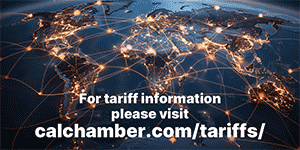 Consecutive rulings by two U.S. courts this week have left in place until later in June the global tariffs imposed by President Donald Trump.
Consecutive rulings by two U.S. courts this week have left in place until later in June the global tariffs imposed by President Donald Trump.
On Wednesday, May 28, a three-judge panel of the U.S. Court of International Trade (CIT) issued a permanent injunction saying that President Trump overstepped his authority by imposing the tariffs.
Immediately following the CIT ruling, the Court of Appeals for the Federal Circuit temporarily reinstated the President’s tariffs when it issued an administrative stay. This means the tariffs will not need to be returned — at least until later in June when the stay is considered.
The CIT, based in New York, said the U.S. Constitution gives Congress exclusive authority to regulate commerce with other countries. That authority is not overridden by the president’s emergency powers to safeguard the U.S. economy, the court said.
At issue is the International Emergency Economic Powers Act (IEEPA) of 1977, which gives the president special authority over economic transactions during a national emergency. Although IEEPA has been used to impose foreign sanctions, Trump is the first president to use the power to impose tariffs. He first declared a national emergency over the fentanyl crisis in the U.S. to impose tariffs on China, Canada and Mexico, then declared that the U.S. trade deficit is a national emergency to justify imposing high tariffs on trading partners around the world.
The lawsuit to stop the Trump tariffs, V.O.S. Selections, Inc. v. Trump, was filed April 14 by the Liberty Justice Center, a nonprofit conservative legal group based in Austin. The center represents V.O.S. Selections, a New York-based alcohol importer and distributor, and four other small businesses that say the tariffs could harm their companies. They filed their lawsuit after President Trump imposed global tariffs April 2 during a White House Rose Garden ceremony on what he called “Liberation Day.” He later paused the tariffs.
California Governor / Attorney General Challenge
On April 16, Governor Gavin Newsom and Attorney General Rob Bonta filed a lawsuit in federal court challenging President Trump’s use of emergency powers to enact the broad, sweeping tariffs that hurt states, consumers, and businesses. The Governor and Attorney General argued that President Trump lacks the authority to unilaterally impose tariffs through the IEEPA, thereby creating immediate and irreparable harm to California, the largest economy, manufacturing, and agriculture state in the nation.
Following up on May 13, Governor Newsom sought an injunction to stop the Trump tariffs immediately.
But Judge Jacqueline Scott Corley of the U.S. District Court for the Northern District of California suggested during a hearing that the California case likely belongs in the New York-based CIT rather than the U.S. District Court where the Governor and Attorney General filed their lawsuit.
On May 28, Governor Newsom said in a statement that the CIT decision affirms the lawsuit he and Attorney General Bonta filed. He pointed out that the CIT decision was issued as part of a separate lawsuit filed by private parties and other states, but aligns with California’s arguments.
More Tariffs?
Other options President Trump might use to impose tariffs include:
- Section 122 of the Trade Act of 1974;
- Section 232 of the Trade Expansion Act of 1962;
- Section 301 of the Trade Act of 1974; and
- Section 338 of the Tariff Act of 1930.
CalChamber Position
The California Chamber of Commerce continues to voice concern about tariffs and any other actions that increase the cost of doing business for California entrepreneurs. The CalChamber has long been committed to supporting a national free trade agenda that fosters economic growth and job creation.
The CalChamber will continue to focus on eliminating tariff and nontariff barriers to support the expansion of American exports. While strategic use of tariffs or the threat of tariffs may be a meaningful negotiation tool, the CalChamber supports efforts to reduce taxation and regulatory burdens as a means to create jobs and economic growth. Further, a focus on trade agreements instead will ultimately lower both tariff and nontariff barriers and help create long-term, sustainable economic growth.
The CalChamber opposes protectionist measures which create uncertainty, disrupt global supply chains, raise consumer prices, limit choices of products for consumers, hinder the competitiveness of California businesses, and invite retaliation.
The CalChamber believes strengthening economic ties and enhancing regulatory cooperation through agreements with our top trading partners that encompass both goods and services, including financial services, is essential to eliminating unnecessary regulatory divergences that may act as a drag on economic growth and job creation.
The CalChamber seeks commercially meaningful outcomes in negotiations with regions around the world and supports bilateral, regional and multilateral trade agreements, which are critical to consumers, workers, businesses, farmers and ranchers, and would allow the United States to compete with other countries that are negotiating agreements with each other.
California’s economy is diverse, and the state’s prosperity is tied to exports and imports of both goods and services by California-based companies, to exports and imports through California’s transportation gateways, and to movement of human and capital resources.
International trade and investment are major parts of our economic engine that broadly benefit businesses, communities, consumers, and state government.
Staff Contact: Susanne T. Stirling


